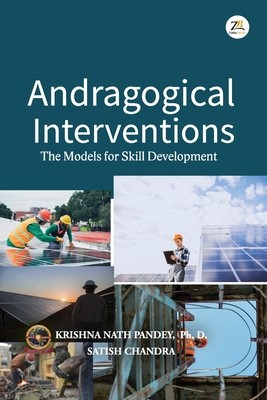
- We will send in 10–14 business days.
- Author: Satish Chandra
- Publisher: Zorba Books
- ISBN-10: 9395217529
- ISBN-13: 9789395217521
- Format: 15.2 x 22.9 x 1.3 cm, minkšti viršeliai
- Language: English
- SAVE -10% with code: EXTRA
Reviews
Description
Andragogical Interventions
Higher Education in India
Chapter 1 Introduction
1.1 Statement of the Problem
1.2 Research Objectives
1.3 Research Gaps
1.4 Research Questions
1.5 Scope of the Study
1.6 Significance of the Study
1.7 Organization of the Research
Chapter 2 Context
2.1 Key Concepts of Flipped Learning
Pedagogy and Its Evolvement
2.1.1 Historical Background
2.1.2 The Concept of Flipped Learning
2.1.3 Misconceptions about Flipped Learning
2.2 Theoretical Frameworks
2.3 Rising Interest in Flipped Learning Pedagogy
2.3.1 Research Studies on the Effects of Flipped Learning
2.3.2 Motivations to Apply Flipped Learning in
Higher Education
2.3.3 Challenges and Barriers Faced in Flipped Learning
2.5 Pedagogical Framework and Course Design
for Flipped Learning
2.6 Factors Impacting the Adoption of
the Flipped Classroom
2.7 Strategies for Successful Implementation of
Flipped Learning
2.8 Flipped Learning Use in Higher Education in
India - Current Status and Challenges
2.9 Conceptual Framework of Flipped Learning in
the Indian Context
Chapter 3 Research Methodology
3.1 Research Design
3.1.1 Study Area
3.1.2 Data Sources
3.1.3 Rapid Appraisal Methodology
3.1.4 Questionnaire Survey
3.2 Unit of Analysis
3.3 Data Collection and Tools
3.3.1 Case Study of JIS College of Engineering,
Kalyani, India
3.3.2 Interviews with Key Informants
3.3.3 Focus Group Discussion.
3.3.4 Questionnaire Survey, Sample Size, and Reliability
Chapter 4 Findings and Analysis
4.1 Application of Flipped Learning Pedagogy in
Higher Education in India
4.1.1 Findings and Observations from a Visit
to a College in India .
4.1.2 Findings from the Interviews
4.1.3 Findings from the Focus Group Discussion
4.2 Key Drivers for the Adoption of Flipped Learning
4.2.1 Findings and Descriptive Analysis
4.2.1.1 Breakdown of Respondents
4.2.1.2 Awareness of Flipped Learning
4.2.1.3 Experience with Flipping a Course
4.2.1.4 Educator Perspective on Students
in Flipped Learning
4.2.1.5 Institutional Support
4.2.1.6 Challenges to Flip Courses
4.2.1.7 The Indian Context
4.2.2 Factor Analysis
4.3 Challenges Faced in Adoption of Flipped
Learning in Higher Education in India
4.3.1 Total Interpretative Structural Modeling
4.3.1.1 Methodology for Challenges
Identification and Validation
4.3.2 TISM Methodology and Model Development
4.4 Framework for Effective Implementation of
Flipped Learning in Higher Education in India
Chapter 5 Conclusion
5.1 Findings and Recommendations
5.2 Conclusion
5.3 Policy Recommendations and Actions for
Indian Higher Education Institutes
5.4 Future Research
EXTRA 10 % discount with code: EXTRA
The promotion ends in 22d.05:58:32
The discount code is valid when purchasing from 10 €. Discounts do not stack.
- Author: Satish Chandra
- Publisher: Zorba Books
- ISBN-10: 9395217529
- ISBN-13: 9789395217521
- Format: 15.2 x 22.9 x 1.3 cm, minkšti viršeliai
- Language: English English
Andragogical Interventions
Higher Education in India
Chapter 1 Introduction
1.1 Statement of the Problem
1.2 Research Objectives
1.3 Research Gaps
1.4 Research Questions
1.5 Scope of the Study
1.6 Significance of the Study
1.7 Organization of the Research
Chapter 2 Context
2.1 Key Concepts of Flipped Learning
Pedagogy and Its Evolvement
2.1.1 Historical Background
2.1.2 The Concept of Flipped Learning
2.1.3 Misconceptions about Flipped Learning
2.2 Theoretical Frameworks
2.3 Rising Interest in Flipped Learning Pedagogy
2.3.1 Research Studies on the Effects of Flipped Learning
2.3.2 Motivations to Apply Flipped Learning in
Higher Education
2.3.3 Challenges and Barriers Faced in Flipped Learning
2.5 Pedagogical Framework and Course Design
for Flipped Learning
2.6 Factors Impacting the Adoption of
the Flipped Classroom
2.7 Strategies for Successful Implementation of
Flipped Learning
2.8 Flipped Learning Use in Higher Education in
India - Current Status and Challenges
2.9 Conceptual Framework of Flipped Learning in
the Indian Context
Chapter 3 Research Methodology
3.1 Research Design
3.1.1 Study Area
3.1.2 Data Sources
3.1.3 Rapid Appraisal Methodology
3.1.4 Questionnaire Survey
3.2 Unit of Analysis
3.3 Data Collection and Tools
3.3.1 Case Study of JIS College of Engineering,
Kalyani, India
3.3.2 Interviews with Key Informants
3.3.3 Focus Group Discussion.
3.3.4 Questionnaire Survey, Sample Size, and Reliability
Chapter 4 Findings and Analysis
4.1 Application of Flipped Learning Pedagogy in
Higher Education in India
4.1.1 Findings and Observations from a Visit
to a College in India .
4.1.2 Findings from the Interviews
4.1.3 Findings from the Focus Group Discussion
4.2 Key Drivers for the Adoption of Flipped Learning
4.2.1 Findings and Descriptive Analysis
4.2.1.1 Breakdown of Respondents
4.2.1.2 Awareness of Flipped Learning
4.2.1.3 Experience with Flipping a Course
4.2.1.4 Educator Perspective on Students
in Flipped Learning
4.2.1.5 Institutional Support
4.2.1.6 Challenges to Flip Courses
4.2.1.7 The Indian Context
4.2.2 Factor Analysis
4.3 Challenges Faced in Adoption of Flipped
Learning in Higher Education in India
4.3.1 Total Interpretative Structural Modeling
4.3.1.1 Methodology for Challenges
Identification and Validation
4.3.2 TISM Methodology and Model Development
4.4 Framework for Effective Implementation of
Flipped Learning in Higher Education in India
Chapter 5 Conclusion
5.1 Findings and Recommendations
5.2 Conclusion
5.3 Policy Recommendations and Actions for
Indian Higher Education Institutes
5.4 Future Research


Reviews